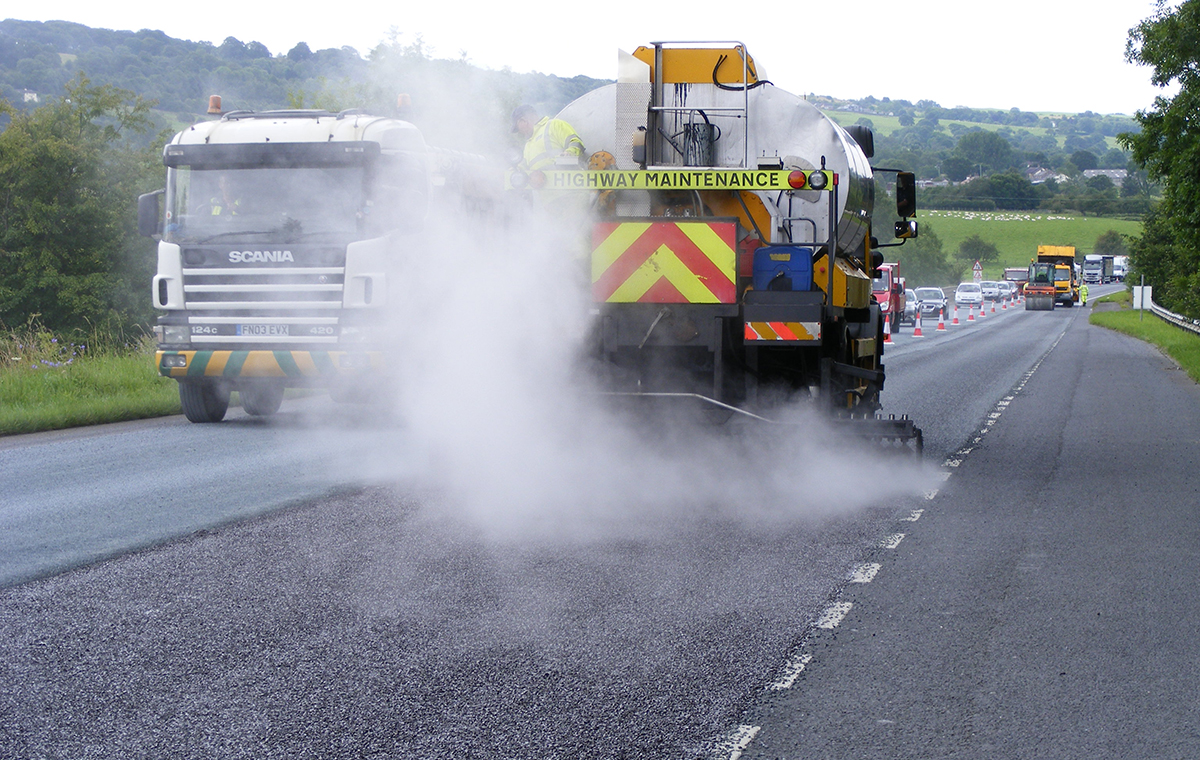
By Rick Ashton, bitumen division market development manager at TotalEnergies Marketing UK
THE UK’s local road network, and the highways authorities responsible for them, face significant challenges. Most critically, building resilience into the road network in accordance with both overarching sustainability goals and mounting pressure to control costs.
Road surfacing and sealing treatments have evolved in recent years, with new innovations going a long way to helping meet this challenge.
Cause for ALARM?
Notably, this includes bitumen emulsion surface treatments which, through restoring skid resistance and sealing early surface cracking, can significantly prolong the service life of roads. Indeed, the most recent ALARM report from the Asphalt Industry Alliance (AIA) found that a road resurfaced today, in 2022, is on average not likely to be resurfaced again for 70 years. This is, to a large extent, thanks to the longevity that emulsion treatments can provide.
Take a cross section of a core sample from any given local road and many layers of varying surface treatments applied over the years as preventative maintenance measures will be revealed. The more recent layers are very likely to be emulsion-based treatments.
Bitumen emulsions are generally a combination of three ingredients: water, bitumen and an emulsifier. Recent R&D progress has seen these products deliver similar performance to thin asphalt surfacing, while using far fewer, finite aggregates resources.
Reducing the use of aggregates has the added benefit of reducing the carbon footprint of the associated logistical functions – including processing and transport.
Further, and in contrast to traditional asphalts, bitumen emulsion is applied at ambient temperatures, reducing energy costs and emissions while also providing health and safety benefits.
Market innovation
Now, polymer-modified bitumen emulsions are available which substantially improve surface resilience with improved low and high temperature performance. Chipping retention is increased, while micro asphalt treatments can be applied in thicker layers.
The first of these polymer-modified solutions for the UK market was pioneered in the 1980s (by TotalEnergies legacy brand Lanfina Bitumen), while the mid 1990s saw a significant breakthrough when a premium grade polymer-modified treatment was deployed on the M62 motorway.
Fast forward to today and the low temperature benefits of bitumen emulsions have been enhanced still further. TotalEnergies’ Emulsis range, for example, can be sprayed at temperatures some 20°C cooler than conventional emulsions. This reduction in temperature requirements provides both cost and environmental benefits, but it also enables significant operational and productivity gains.
Estimates suggest that the efficiencies achieved through not having to maintain viscosity at higher temperatures results in additional square meters of road being surfaced equating to extending the short 13 week seasonal window for works to the equivalent output of 15 weeks’ work.

Prevention is the best cure
But, to go back to the ALARM survey, early intervention is critical. The survey revealed that over the last year 1.7 million potholes were filled, equivalent to one every 19 seconds. Roads classed as RED (poor overall condition) also saw a 2% increase, bringing the total likely to require maintenance in the next 12 months to 11% – around 22,000 miles.
The ALARM survey is based on data from England and Wales, but the picture is mirrored in Scotland where a Freedom of Information Request obtained by the BBC found the projected cost of the road repairs backlog to be around £1.7 billion.
It is largely thanks to bitumen emulsion products that we are not facing an even worse crisis.
The costs for getting this wrong are potentially eye watering. The AIA data suggests it is 20x more expensive to carry out reactive remedial maintenance than planned preventative maintenance. But cost is broader than public finance. Cost also includes emissions, natural resource usage, and public disruption.
Sealing micro-cracks and preventing water ingress and the subsequent freeze-thaw cycle that ultimately leads to pothole formation and other surface defects is vital.
Through early intervention using the latest, high quality emulsion surface treatments, we can help our roads to stand the test of time.








